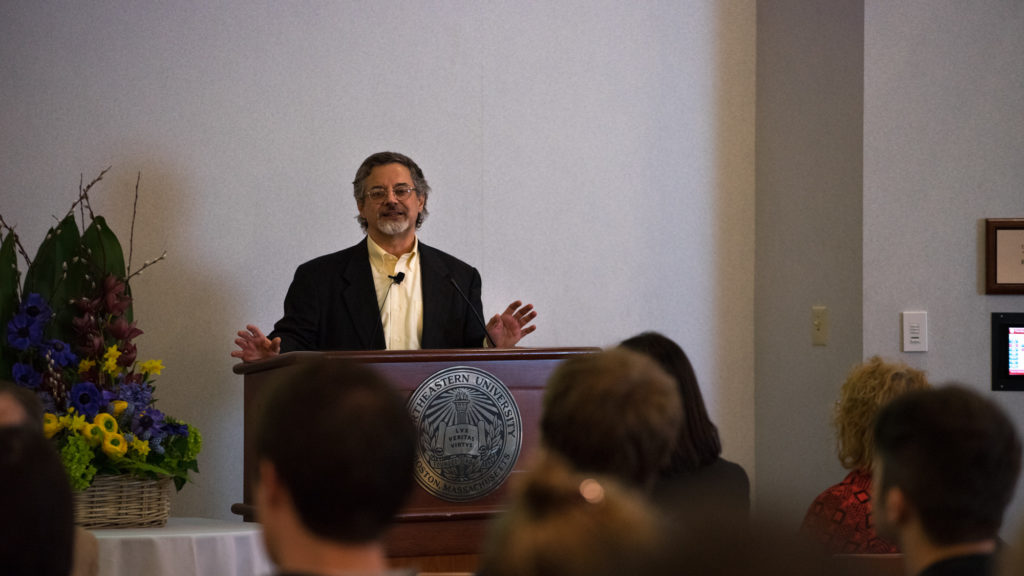Professor honored, gives lecture on human behavior modeling
March 22, 2017
Stacy Marsella was given open reigns to discuss whatever he wanted at his public lecture, except for one sole instruction from the provost: Be entertaining.
Marsella, a professor of computer science and psychology, was the recipient of the 53rd Klein University Lecturer Award, which honors a member of the teaching faculty who has contributed with distinction to his or her own field of study. He delivered his lecture, “How and Why We Simulate Human Behavior,” on Monday in the Raytheon Amphitheater.
Marsella’s audience was made up of more than 100 students, faculty, computer scientists and psychology experts from around the world. He decided to focus the lecture on the research he has done with modeling human emotions and how that has contributed to his ability to simulate human behaviors.
“Emotions influence both our decision making and our social interaction, so that seemed like a natural starting point,” Marsella said in an interview with The News. “Everyone kind of resonates—everyone has emotions and it’s kind of a common ground to start a discussion on because you mention these emotion category words like anger and people have a sense of what that means. We’ve all experienced emotions.”
Northeastern Provost James C. Bean said Marsella was chosen because of his work modeling emotion, cognition and social behavior using computers and his use of these models in various applications.
“His current research studies the interplay of emotion and cognition in decision-making as well as the role that beliefs about others and nonverbal behavior play in social interaction,” Bean said. “He pursues a highly interdisciplinary approach that integrates methods and models from computer science, psychology and art.”
The Klein University Lecturer Award was established in 1964 upon recommendation by the Northeastern Faculty Senate. In 1979, the award was named for the then-late Robert D. Klein, a professor of mathematics and vice chairman of the Faculty Senate.
Bean said the award gives faculty an opportunity to share their work with the Northeastern community and the public. 2013 recipient Daniel Medwed, a professor of law and criminal justice, was unable to attend the talk but said the award is highly esteemed.
“The Klein lectureship is among the highest honors at the university and I am still very grateful for and humbled by my selection four years ago,” Medwed said in an e-mail to The News.
Though Marsella’s subject matter was very specific and complex, his lecture included videos, charts and comprehensive examples so that the general audience members could understand his work at a basic level.
“You’re faced with the issue of the fact that you’re talking about the merge of computer science and psychology and very few people in the audience are going to have expertise in both those areas,” Marsella said. “So really the only solution is in that case given the general audience and given that you’re doing this transdisciplinary work is to pop up a level of abstraction and try to familiarize people with the concepts and avoid getting trapped in too much detail.”
As he talked about his research in computational modeling of emotion, Marsella described that it could be used as a methodology for psychologists to study and predict human behaviors very precisely. He also said it can also provide insights to artificial intelligence theories, which must look at the function of emotion in human interactions.
These models were also essential to Marsella’s work creating simulations of entire cities’ human responses before and after natural disasters, which aimed to train first-responders and optimize their reactions to conflicts.
However, the city models were a lesser topic for Marsella during his lecture. Instead, he largely made examples out his work with virtual humans, or computer models which act as humans do: Reason about their environments, understand and express emotions and use dialogue to interact with people.
“When you look at all that technology on virtual humans you realize there’s a lot of knowledge about human behavior that goes into building something like that,” Marsella said. “Not entirely things about dialogue but also knowledge about, ‘What are the emotions actually being felt by the human? How should the virtual human express its emotions back to the human?’”
He showed an example of a virtual human speaking with a person about his feelings and responding as a human might, both to the things the person said and how he said them. Virtual humans, Marsella said, can be applied to train professionals in health intervention, medical adherence and social skills and could make massive contributions in psychological experiments.
Though Marsella focused his lecture on taking ideas out of psychology and applying them using computer science concepts and computational models, he said these were all just examples of transdisciplinary work. His primary goal, he said, was to spark the audience’s interest in engaging in research across fields of study.
“The main thing I was interested in doing was giving people in the audience a sense of the wonder and the excitement associated with doing this kind of interdisciplinary work,” Marsella said. “That really, to me, is the most important part of the message.”







